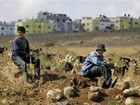More than 100 demonstrators briefly clashed with police outside the Egyptian embassy in Beirut on Thursday after they tried to break through the security cordon around the diplomatic mission, a security official said.
"Police intervened to push back the demonstrators after they tried to break through the barbed wire in order to enter the embassy," the official told Agence France Presse, speaking on condition of anonymity.
 Full Story
Full Story
Israeli troops began constructing a barbed wire fence around the southern village of Ghajar on Thursday.
A high-ranking United Nations Interim Force officer inspected the site, while a source from the international force told the Central News Agency that the issue of Ghajar is very difficult and complicated, adding that it needs time to be resolved.
 Full Story
Full Story
Caretaker Labor Minister Butros Harb stated on Thursday that Prime Minister-designate Najib Miqati is attempting to allow the participation of all political powers in the new government, including the March 14 forces.
He told the Central News Agency that the March 14 camp may take part in Cabinet if Miqati respects the issue of the Special Tribunal for Lebanon and Hizbullah’s arms possession, and if he ensures that the March 14 forces would be able to play an effective role in preventing decisions that would harm Lebanon.
Full StoryPhalange Party leader Amin Gemayel stressed on Thursday that Prime Minister-designate Najib Miqati’s allies should facilitate his mission of forming a new government.
He said after holding talks with British Ambassador to Lebanon Francis Mary Guy that the March 14 camp has done all it could, met Miqati, and informed him of its readiness to maintain Lebanon’s interest.
 Full Story
Full Story
Lebanon's economy should be able to survive the political turmoil that has seen the appointment of a Hizbullah-backed premier due to the strength of the country's banking system and replete foreign currency reserves, analysts say.
"The financial defense lines are currently the strongest in Lebanon's history," said Marwan Barakat, chief economist at Bank Audi, one of the leading banks in the country.
 Full Story
Full Story
Free Patriotic Movement leader Michel Aoun has denied that he nominated Najib Miqati as premier to take revenge on Saad Hariri for shunning him from the presidency.
In an interview with the Qatari al-Watan newspaper published Thursday, Aoun said he named Miqati because he had a problem with Hariri’s internal policies.
 Full Story
Full Story
Egyptians in Lebanon are anxiously watching developments in their strife-torn homeland, fearing that their country is sliding into an unending cycle of chaos and political turmoil.
"All I can think, watching the protests, is that we are going to be the next Lebanon or even the next Iraq," said Shahta al-Masri, a Beirut gas station attendant who hails from Al-Mahalla Al-Kubra in the Nile Delta.
 Full Story
Full Story
Premier-designate Najib Miqati visited President Michel Suleiman on Wednesday to inform him about the demands of the March 8 and 14 forces on the cabinet, An Nahar daily said.
The newspaper quoted sources as saying that both officials agreed to give contacts more time to exhaust all efforts to form a national unity cabinet or a national salvation government that includes both coalitions.
 Full Story
Full Story
Members of the so-called Hizbullah cell convicted of plotting attacks in Egypt were among the escapees in a weekend prison break, a security official told Agence France Presse Thursday.
The 22 cell members fled on Sunday along with members of Palestinian group Hamas, the Muslim Brotherhood and thousands of other convicts during a mass breakout amid anti-government protests in Egypt.
 Full Story
Full Story
Premier-designate Najib Miqati is reportedly facing stiff demands by Free Patriotic Movement leader Michel Aoun to be granted the majority of Christian seats in the new government.
Miqati’s brother, Taha, met with Aoun in Rabiyeh on Tuesday. An Nahar said that the FPM leader sent a message to the prime minister-designate that he wants a big share that “suits the size of his parliamentary bloc and his popular representation.”
 Full Story
Full Story



